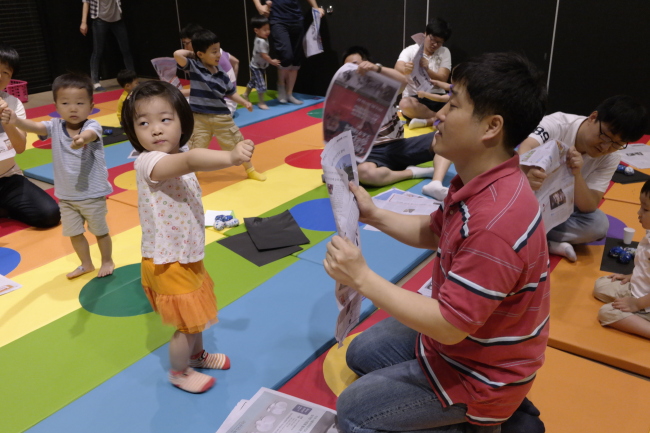Seven pairs of fathers and children pile up colorful sand in glass bottles at a public child care center on a Saturday in Seocho-gu, southern Seoul. Laughter fills the room as the dads help the kids finish their masterpieces.
Clutching the sand-filled bottle in one hand as a souvenir, and holding the father’s hand in the other, the children return home beaming.
This simple activity class is a part of the district’s program designed to encourage bonding between fathers and children. It is a precious opportunity to “learn” how to become good parents. The curriculum of the weekly class ranges from dance and art to physical activities.
 |
A father and his daugther tear newspapers as part of Seoul City’s program for dads and children at City Hall in Seoul. (Seoul Metropolitan Government) |
“Fathers can learn how to play with their children at home and how to communicate with them. As long as the parents know the methods, they can contribute a lot to child care,” said program coordinator Park Hye-mi at Seocho-gu Office.
Joo Dan-ha, a 33-year-old office worker who raises his 4-year-old daughter and six-month toddler, is one of the fathers in the class. He found out about the program through advertisements.
“When playing with my kids, I try to apply what I have learned in class. I can see how I have changed after starting the class,” Joo said.
To make classes more convenient for working fathers, district offices carry out the classes only on Saturdays.
Seongbuk-gu Office in the northern capital runs ice-skating classes from last year. Guro-gu Office in southwestern Seoul launched a baseball team comprised of children and fathers in 2010.
Besides independent programs by districts, the city government offers diverse programs teach child care in general.
For an hour every Thursday, fathers take parenthood lectures while having lunch at Seoul Support Center for Childcare Center near City Hall. Fathers are only required to pre-register for the class and pay 5,000 won ($4.50) for the meal.
The center’s chief, Lee Nam-jung, said learning how to become a good father was not something men should be embarrassed about, but a necessary and natural process.
“Unfortunately, fathers in our generation have never seen their fathers sharing extra time for them, other than working hard. That’s why learning is more important for Korean fathers than any others,” said Lee.
“We aren’t all naturally born to be parents. Fathers and mothers have to be made.”
Fathers’ contribution to child care greatly affects their children’s self-esteem, according to child development and education professor Kim Jin-wook at Myongji University.
“When kids share time with their fathers, they think they are becoming the entire world of their fathers. The more time they spend with each other, the more the children’s self-esteem tends to improve,” said Kim.
Meanwhile, the government has come up with measures for working fathers as part of efforts to encourage them to participate in child care.
Employers, who allow their employees to take a leave of absence are eligible for monthly subsidies of 100,000-200,000 won ($182), depending on the size of the company. Fathers who wish to temporarily work part-time to make room for child care, can receive 60 percent of their ordinary wages up to a year.
Under the current law, each parent can take up to one year of parental leave for children aged 8 or younger. Employers who do not allow parental leave can be fined up to 5 million won.
By Lee Hyun-jeong (
rene@heraldcorp.com)



![[Today’s K-pop] Blackpink’s Jennie, Lisa invited to Coachella as solo acts](http://res.heraldm.com/phpwas/restmb_idxmake.php?idx=644&simg=/content/image/2024/11/21/20241121050099_0.jpg)




